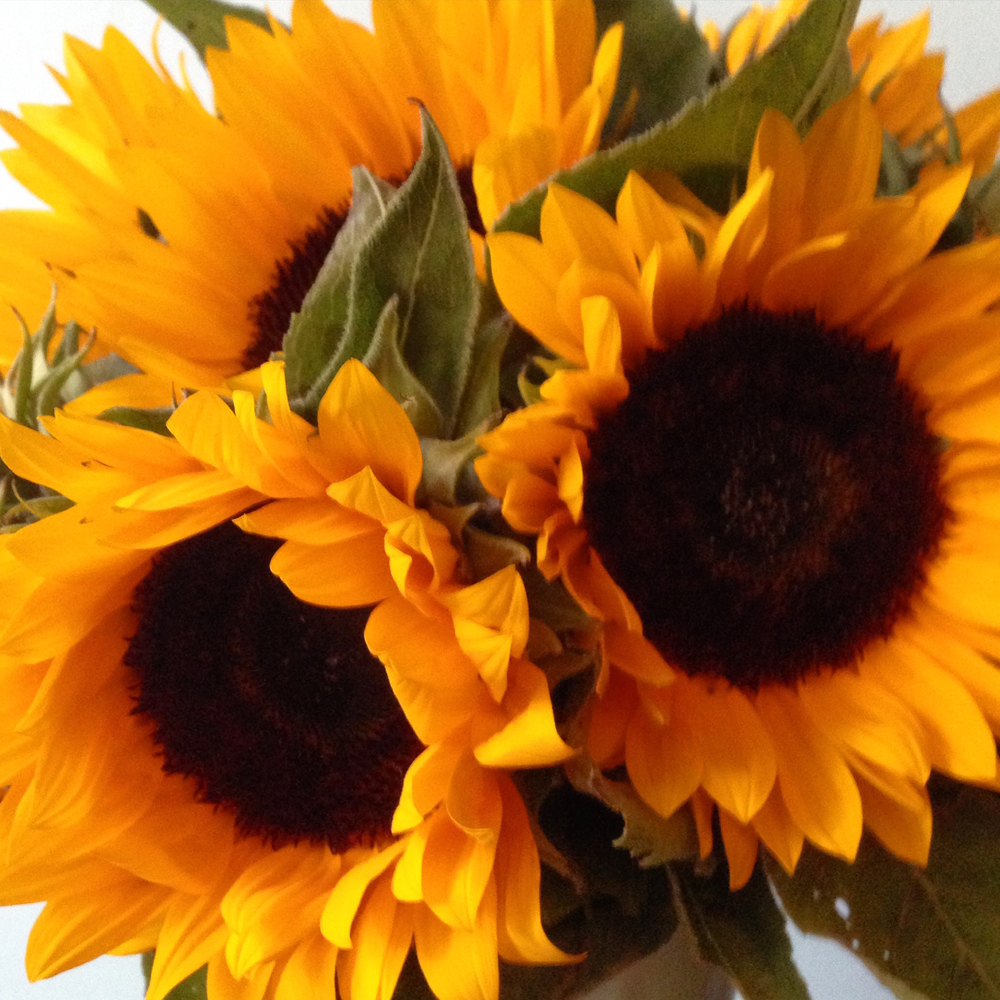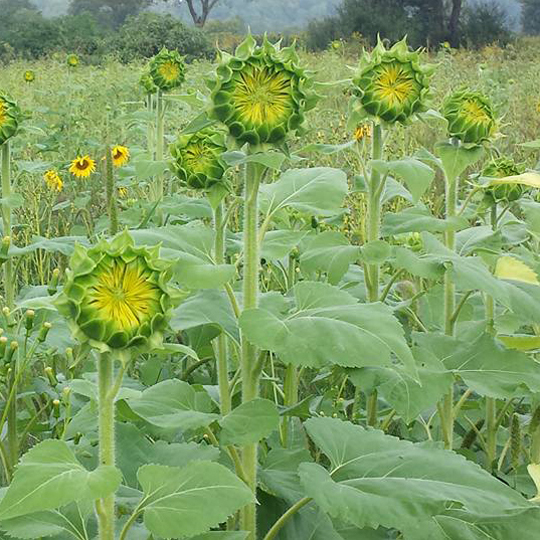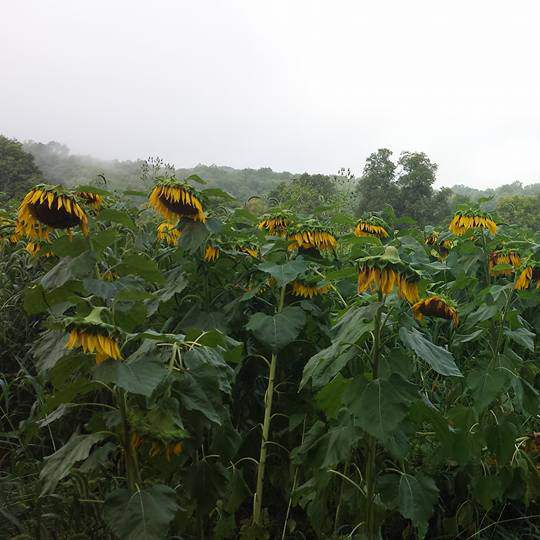 New Jersey is a state with over 700,000 acres of farmland where plenty of agritourism opportunities abound. We favor the most fleeting: u-pick berries and seasonal living mazes.
New Jersey is a state with over 700,000 acres of farmland where plenty of agritourism opportunities abound. We favor the most fleeting: u-pick berries and seasonal living mazes.Ah Sun-Flowers, who so cheerfully count our steps through this maze...Please forgive our little riff on William Blake’s illustrated poem "Ah! Sun-flower". Visiting The Original NJ Sunflower Maze has made us wax poetic.
We believe there are few things more impressive than the sight of 50 acres planted with sunflowers. Being able to explore over three miles of meandering paths through nodding flower giants is simply icing on the cake.
Liberty Farm’s owner Raj Sinha has been creating and producing The Original NJ Sunflower Maze, a living ode to the sunflower’s enduring allure, since 2011. Originally grown on a leased lot in Augusta (home of the NJ State Fair), the maze is now resplendent on Liberty Farm’s main acreage located in historic Sandyston, NJ.
Wonderfully welcoming staff members are always on hand to answer questions and to offer educational tidbits about the flowers, farm, and maze.
All types of sunflower seeds originate from the common sunflower, Helianthus annuus. Specialized and hybrid varieties abound, some varieties reaching 10-15 feet tall, sporting a solitary bloom the size of a serving platter. Others are knee-high, multi-branched affairs with many small blooms.
Sunflowers are sown in spring and mature by autumn. August through early September is peak sunflower viewing season in North Jersey, depending on Mother Nature’s whim, of course.
Young sunflowers exhibit "heliotropism" (directional growth toward sunlight) during the bud stage, but the flower heads do not follow the Sun across the sky. From my personal experience (and a momentary lapse of good garden planning), mature sunflowers ultimately face their heads east.
The beauties within this maze yield black oil sunflower seeds, a favorite of wild birds. One mammoth sunflower head can have up to 2,000 large seeds. The thin shells are easy for most seed-eating birds to crack open, and the kernel’s high fat content make for an extremely valuable food source for winter birds.
Nutritionally-similar gray striped sunflower seeds are more commonly grown for human consumption, but they are also sold as wild bird feed. Striped varieties have a thicker shell, making them harder for soft-billed birds to crack.
If you grow your own giant sunflowers, be mindful of autumn’s marauding birds and squirrels. Cover the head with a mesh onion bag, loose burlap or even paper bag as soon as the center petals start to dry out the seed kernels begin to swell. Check every few days for plump, hard-shelled seeds; cut the stalks at the base.
Remove the seeds by rubbing the center to dislodge them, either by hand or by rubbing them on a square-mesh cooling rack placed over a large bowl.
The folks of Liberty Farm are as committed to sustainable farming as they are to promoting the health and well-being of native pollinators. Their no-till method of farming is especially appealing to knowing gardeners.Roasted Sunflower Seeds
Yield: 1 cup
Sunflowers were first grown for food and oil by the American Indians, and remain a popular snack for the health-minded. A handful of seeds supply a significant amount of vitamin E, magnesium and selenium.
We like fairly salty sunflower seeds, but you can increase the salt to 4 tablespoons (1/4 cup.) For less salty seeds, decrease to 2 tablespoons, or omit the salt entirely. Don’t skip the simmering step: this keeps the shells from burning.
Sunflower seeds can quickly go from "dry and easy to open" to "charred and bitter", so test a few seeds every couple of minutes for doneness.
Because of the high oil content, roasted sunflower seeds can turn rancid if stored improperly, so keep them in a cool, dry area or refrigerate them. To freeze, place seeds in a freezer bag, removing as much air as possible.
Preheat oven to 400°F.
- 1 cup raw in-shell sunflower seeds
- 3 tablespoons kosher salt
- 1 quart water
In a medium saucepan over medium heat, bring seeds, salt, and water to a boil. Reduce heat to low and simmer 18 minutes (simmer 10 minutes if omitting salt.)
Drain thoroughly and spread seeds evenly in a single layer on a rimmed baking sheet. Roast in the middle rack for 7-14 minutes, removing the sheet and checking a few seeds for desired roasting every 2 minutes, starting at 7 minutes.
Transfer seeds to a cool baking sheet. Cool to room temperature, and transfer to a covered, airtight container.
Liberty Farm very proudly participates in the NJ Audubon SAVE and Jersey Grown programs. When viewed from above, their first sunflower maze (also the first ever in NJ) stated simply, "SAVE."
SAVE (Support Agricultural Viability and the Environment) is a nifty program created in 2008 by New Jersey Audubon with support from the state Department of Agriculture. The program buys locally grown black oil sunflower from the sunflower farmers and sells it as birdseed statewide. SAVE also establishes 1 acre of grassland habitat for wild nesting birds for every 5 acres planted in sunflowers.
Jersey Grown is New Jersey's brand for locally grown plants, plant materials, and feed. Use of the
brand certifies the item was grown in New Jersey, checked for quality and is disease and pest-free.
Both NJ Audubon SAVE and Jersey Grown programs help reduce dependence on distant farms, help promote local economy, and help improve the environment through land conservation.
At the entrance is a small farm stand where we happily offered some support to the local economy. Farm-fresh veggies, fresh-cut sunflowers and Liberty Farm’s own brand of salsa, Jersey Devil are happy souvenirs of time well spent in a maze.
 Liberty Farm, home of The Original NJ Sunflower Maze
Liberty Farm, home of The Original NJ Sunflower Maze101 Route 645
Sandyston, NJ 07826
(Near mile marker 125 on Route 206)
Shutterbugs: This gorgeous location is a perfect backdrop for birthday, engagement, wedding and other special occasion photos.
- Hours daily 9 am - 6 pm (Seasonal)
- Admission: $ 10 adults $ 6 kids 12 to 4 (kids under 3 are free.)
- Closed-toe shoes are recommended.
- Well-behaved, leashed pets are welcome. Owners must clean up after their pets.
- Visit their Facebook Page for up-to-date information, including hour changes and weather-related closings.




